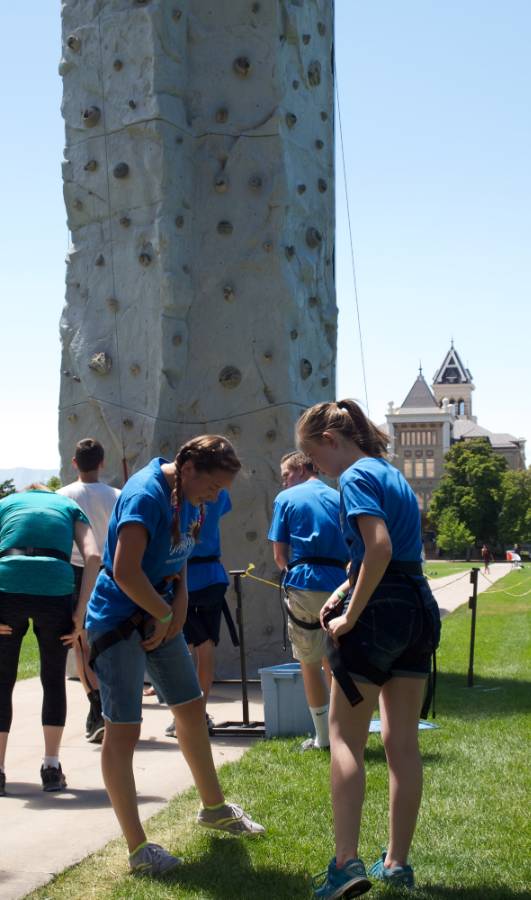Adult and Youth Codes of Conduct
Utah law and Utah State University policy require personnel to report actual or suspected abuse or other improper conduct involving a minor. When interacting with minors in Utah State University programs, the following code of conduct applies.
USU Employee/Volunteer Code of Conduct
USU employees and volunteers may encounter Minors in many areas during their employment with USU, whether involved in a Covered Program or not, and should conduct themselves in a respectful, honest, and caring manner at all times when Minors are present.
Employees/Volunteers shall NOT:
- Engage in abusive conduct of any kind toward, or in the presence of, a Minor.
- Use any form of physical or corporal punishment to discipline a Minor. If restraint is necessary to protect a Minor from self-harm or protect other Minors from harm, all incidents must be documented and disclosed to the Program Administrator and the Minor's parent/guardian.
- Engage in any sexual activity, make sexual comments, tell sexual jokes, or share sexually explicit material (or assist in any way to provide access to such material) with Minors.
- Engage in romantic, sexual, or related conversations with Minors.
- Communicate electronically with Minors unless there is an educational or programmatic purpose and the content of the communication is consistent with the mission of a Covered Program and the University. This includes email, text messages, social networking websites, Internet chat rooms, or other forms of social media. If communicating electronically is necessary, another Authorized Adult shall be copied on the communication.
- Communicate with a Minor participant after a Covered Program has concluded, unless the communication is conducted with the knowledge and permission of the Minor’s parent/guardian.
- Physically touch a Minor in a manner that is prohibited by law or that a reasonable person would interpret as inappropriate. Touching, when necessary, should be appropriate, public and non-sexual. It should be in response to the Minor's needs, for a purpose that is consistent with a Covered Program's mission and culture, and/or for a clear educational, developmental, or health related (i.e., treatment of an injury) purpose. Any resistance from the Minor to being touched should be respected unless the touching is necessary to stop immediate harm to the Minor or others or to assist in rendering urgent or emergency medical treatment.
- Be alone with a Minor unless the one-on-one interaction is authorized as part of the Risk Management Plan. When one-on-one interaction is authorized, the interaction should be in a public space or space that permits observation by other persons. An employee/volunteer should never be in a locked room with a Minor unless there is an emergency situation.
- Meet with a Minor outside of established times for Covered Program activities. Any exceptions require written authorization from the Program Administrator and the parent/guardian.
- Invite a Minor to a private location such as a private residence or engage in an overnight visit with the Minor.
- Use, possess, or be under the influence of alcohol or illegal drugs while on duty or when responsible for a Minor's welfare.
- Transport a Minor in a vehicle for personal reasons not related to a Covered Program, unless there is written authorization from the Program Administrator and the Minor’s parent/guardian.
- Accept from or give gifts to a Minor without the knowledge of the Minor’s parent/guardian.
- Leave a Minor or Minors under the supervision of a person who is not an Authorized Adult; for example, with a guest presenter, during a field trip, etc.
- Shower, bathe, or undress with or in the presence of a minor.
- Tell children “this is just between the two of us” or use similar language that encourages minors to keep secrets from their parent/guardians.
fa-info
Suspect Abuse or Neglect of a Minor?
Call the local police (911 or a non-emergency line) or the Child Abuse/Neglect Hotline (1-855-323-3237). Questions? Learn more on our reporting page.

Red Flag Adult Behavior
While the University Code of Conduct provides guidelines for what is allowable in interactions between adults and Minors as part of a University program, there are behaviors that may not reach the level of a violation of the Code of Conduct, but can be a sign of potentially predatory behavior. These are referred to as Red Flag Behavior and should be taken seriously by any program supervisors or administrators. Any staff member or volunteer engaging in this behavior should be corrected immediately. Child predators consistently test boundaries in their interactions with Minors in a process called “grooming.” The following are examples of grooming behavior exhibited by child predators.
- They engage in a lot of physical play with Minors, including tickling, wrestling, and “horseplay.”
- They initiate inappropriate physical touch.
- They “single-out” or pay special attention to a specific Minor or small group.
- They put themselves in a position to be alone with a specific Minor.
- They encourage a Minor to keep secrets from parents or guardians by saying things such as “this is just between the two of us.”
- They exhibit or engage in violent behavior towards a Minor.
- They do special favors for, or give gifts to, a specific Minor.
Participant Behavioral Code of Conduct
All Covered Programs should have a Participant Behavioral Code of Conduct that, at a minimum includes these items:
- The possession or use of alcohol, tobacco, and other drugs is prohibited.
- The possession or use of fireworks, guns, and other weapons is prohibited.
- The operation of a motor vehicle by Minors is prohibited while attending and participating in the program.
- No violence, including sexual abuse or harassment, will be tolerated.
- Hazing of any kind is prohibited.
- Bullying including verbal, physical, and cyber bullying is prohibited.
- Theft of property is prohibited.
- Misuse or damage of University property is prohibited. Charges will be assessed against those participants who are responsible for damage or misuse of University property.
- The inappropriate use of cameras, imaging, and digital devices is prohibited, including use of such devices in showers, restrooms, or other areas where privacy is expected by participants.
Covered Programs may add to this list as is appropriate to the program and/or activity. Participant Behavioral Codes of Conduct should be included in the risk management plans and in documentation provided to parents and/or legal guardians.
Child to Adult Ratio
| Age Range | # of Adults | # of Children | Overnight Children |
|---|---|---|---|
| 0-5 years | 1 | 6 | 5 |
| 6-8 years | 1 | 8 | 6 |
| 9-14 years | 1 | 10 | 8 |
| 15-18 years | 1 | 12 | 10 |

Contact Us
Utah State University Risk Management
Phone: 435-797-1951
Email: risk@usu.edu
Mailing Address:
6600 Old Main Hill
Logan, UT 84322




